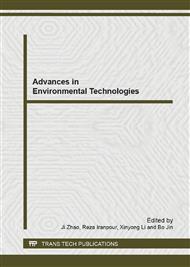p.892
p.898
p.902
p.907
p.913
p.917
p.921
p.926
p.931
Snow Disaster Risk Assessment in China with the Multi-Layer Fuzzy Comprehensive Evaluation Method
Abstract:
The snow disaster is one of the main disasters in prairie pastoral areas of China. Once the snow disaster occurs, it will cause the death of a large amount of livestock due to the starvation and freezing weather. Therefore, it is especially important to forecast the risk of the snow disaster scientifically and reasonably. This paper established the snow disaster risk assessment index system firstly, and then established the snow disaster risk assessment model based on multi-layer fuzzy comprehensive evaluation. Finally, the massive experiment monitors and the contrast confirmation with the historical case data, showed that this model is practical and feasible, which conducted a useful attempt to further improve snow disaster risk assessment ability in pastoral areas.
Info:
Periodical:
Pages:
913-916
Citation:
Online since:
August 2013
Authors:
Price:
Сopyright:
© 2013 Trans Tech Publications Ltd. All Rights Reserved
Share:
Citation:


